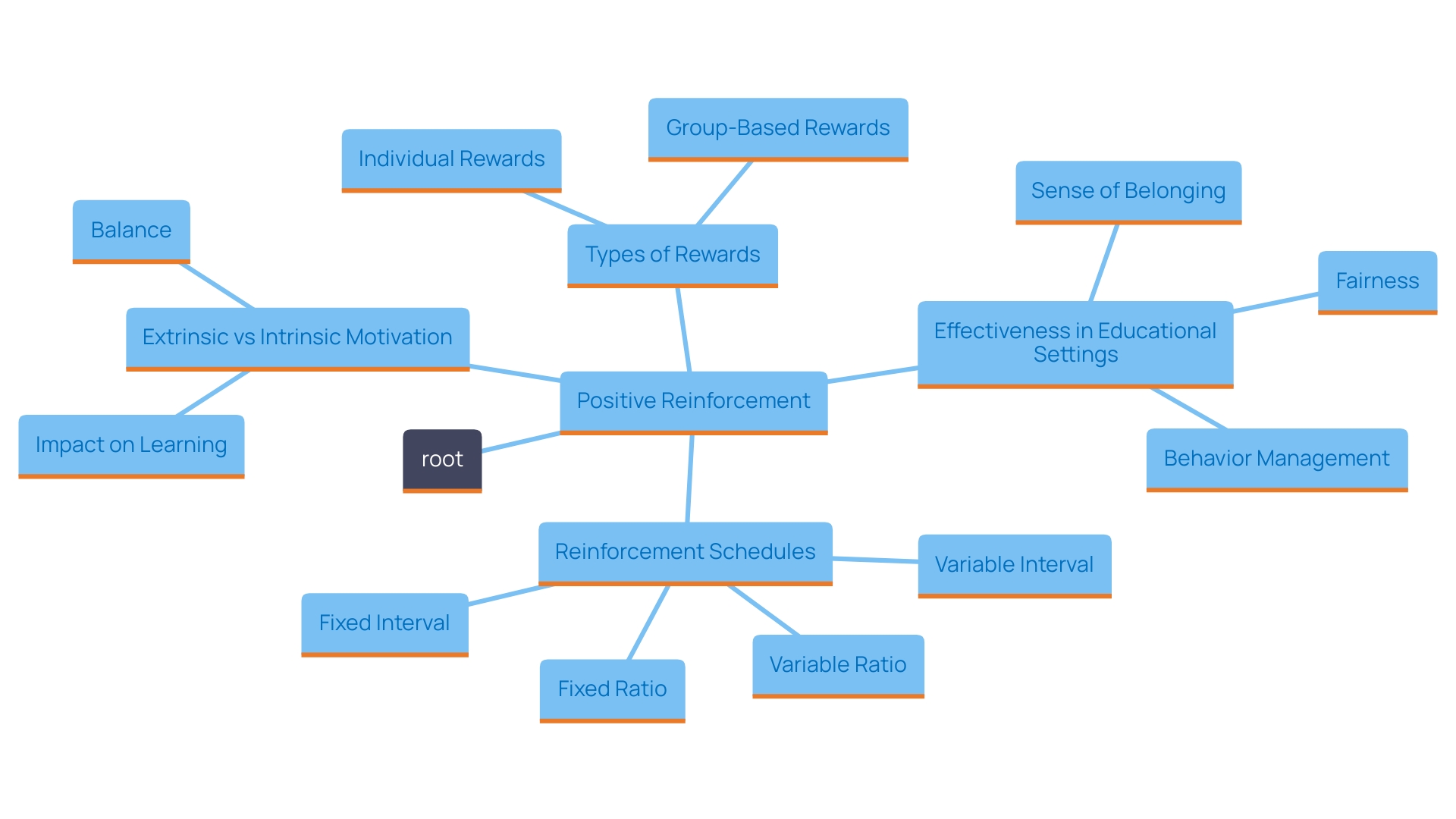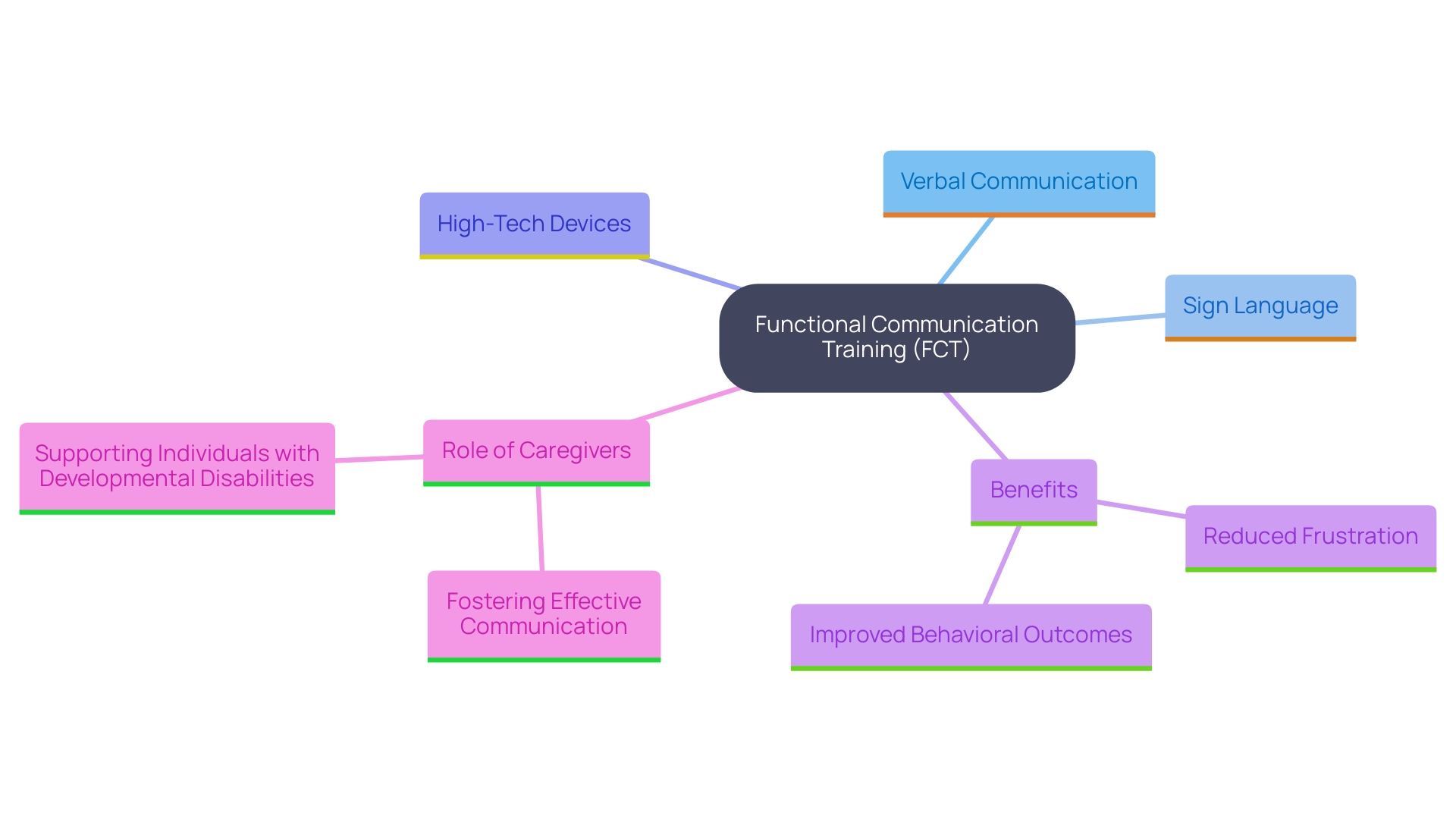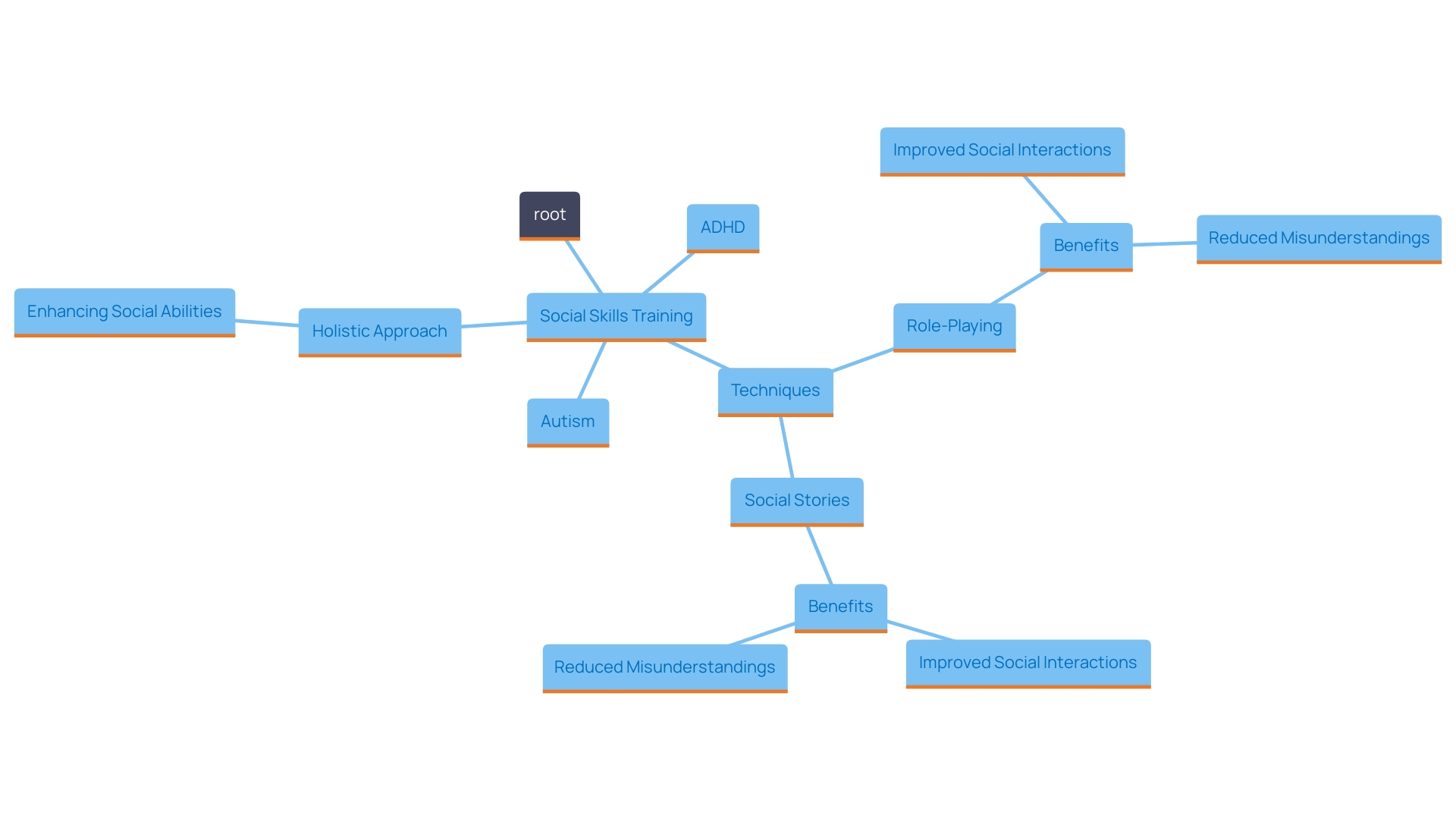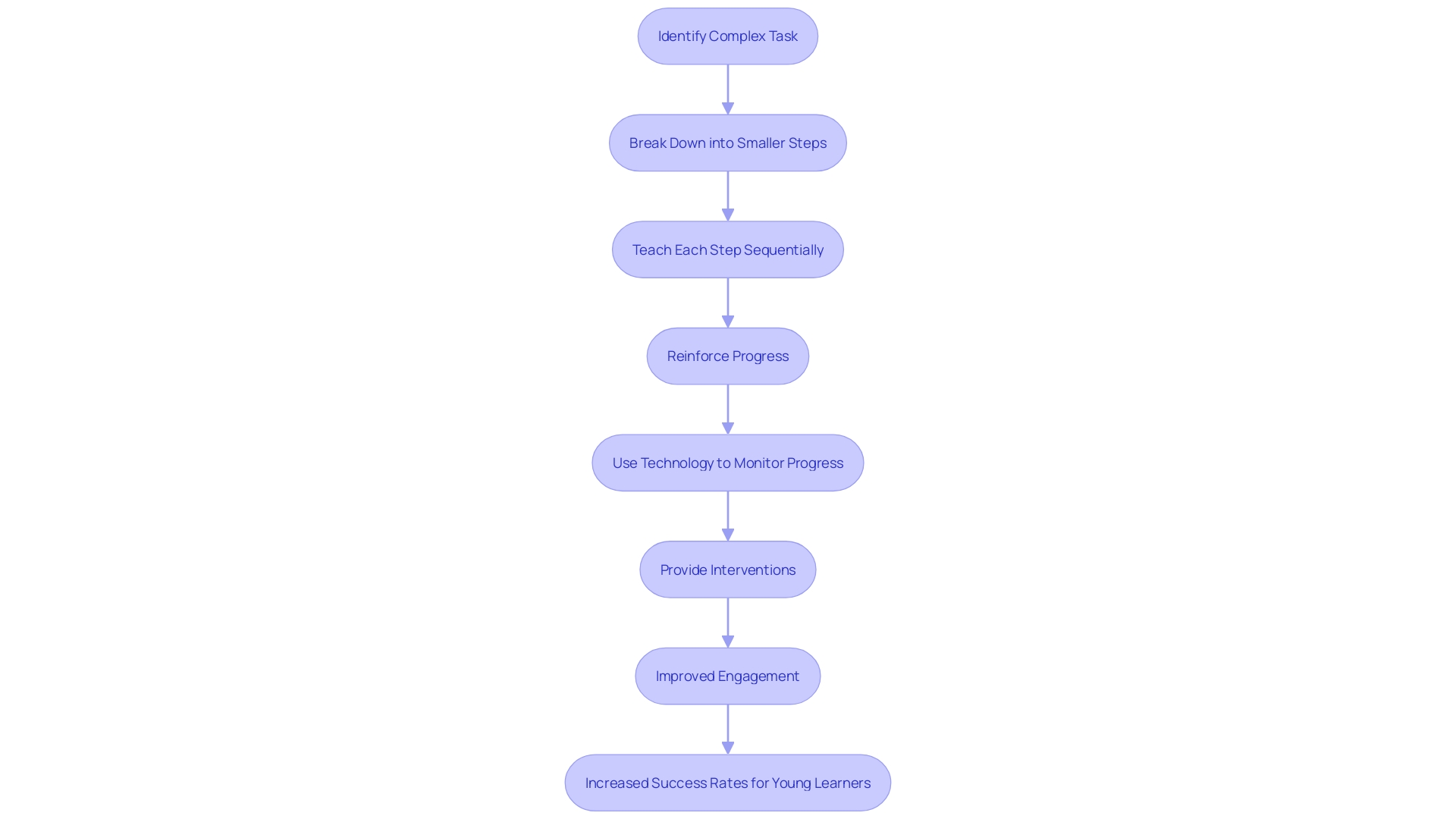Introduction
Navigating the complexities of raising children with autism and ADHD presents unique challenges, but it also opens the door to transformative strategies that empower both children and their caregivers. This article delves into four key methodologies—Positive Reinforcement, Functional Communication Training (FCT), Social Skills Training, and Task Analysis—each designed to foster positive behavior, enhance communication, build social skills, and simplify complex tasks. By understanding and implementing these approaches, caregivers can create supportive environments that not only reduce frustration and anxiety but also promote independence and self-confidence.
The insights shared here serve as essential tools for ensuring the well-being of children, ultimately paving the way for a brighter, more inclusive future.
Positive Reinforcement
Positive reinforcement appears as an invaluable approach for managing difficult actions in youngsters with autism and ADHD. This method consists of rewarding young individuals for demonstrating preferred actions, thus motivating them to replicate these actions in the future. Rewards can be diverse, ranging from verbal praise and tokens to additional playtime, making reinforcement both tangible and meaningful.
The effectiveness of positive reinforcement lies in its ability to create a clear connection between the action and the reward. For instance, a continuous schedule of reinforcement rewards every instance of a behavior, such as offering a small treat every time a student finishes their homework. This clarity helps children understand what is expected of them, significantly enhancing their motivation to engage in positive actions.
Research indicates that structured reward systems can be particularly beneficial in classroom settings, especially for students with special needs. A principal in a large urban elementary school noted that such systems effectively motivated good behavior among her students. However, it is essential to balance these rewards with a love for learning, as concerns have been raised about the potential for reward systems to overshadow intrinsic motivation.
Moreover, different schedules of reinforcement can be employed to maintain engagement. For instance, a variable interval schedule rewards young individuals unpredictably, similar to a pop quiz in school, which promotes consistent effort. In practice, this means that young ones may receive praise or a small reward at random intervals, keeping them attentive and engaged without becoming complacent.
As Dr. David R. Offord, a noted psychiatrist for young people, once articulated, recognizing both the unmet needs of youth and their innate strengths is crucial. Positive reinforcement not only aids behavior management but also promotes a sense of fairness and belonging, crucial for the healthy growth of all young individuals, especially those encountering extra challenges. This thorough method guarantees that caregivers possess the tools and resources needed to support their offspring's development and health.

Functional Communication Training (FCT)
Functional Communication Training (FCT) is a transformative approach designed to equip individuals with autism and ADHD with the tools they need to express their needs effectively. This strategy concentrates on substituting challenging behaviors with effective methods of communication, ultimately lowering frustration for both the young person and their caregivers. By teaching various modes of communication—ranging from verbal expressions to sign language and high-tech communication devices—FCT empowers young individuals to articulate their wants and emotions in a way that others can understand.
According to the National Academies of Sciences, Engineering, and Medicine, augmentative and alternative communication (AAC) encompasses a broad spectrum of methods that support or replace spoken language. These include gestures, facial expressions, manual signs, and even sophisticated speech-generating devices. The goal of AAC is to provide immediate and ongoing access to effective communication tools as soon as challenges are identified. A robust communication system can foster independent and meaningful interactions, which is particularly vital for young individuals with developmental disabilities.
Research indicates that youngsters who have access to appropriate communication strategies tend to exhibit fewer behavioral issues, enhancing their overall well-being. Dr. David Offord highlighted the significance of fair involvement for all young individuals, including those with disabilities, in different facets of life. This participation is essential for mental health and supports the development of crucial life skills.
By incorporating Functional Communication Training into everyday activities, caregivers can ensure that young individuals not only learn to convey their needs but also gain confidence in expressing themselves. This supportive environment ultimately contributes to a more harmonious and understanding community.

Social Skills Training
Social skills training plays a crucial role in empowering individuals with autism and ADHD to effectively interact with peers and adults. This multifaceted approach includes techniques such as role-playing, which allows young individuals to practice various social scenarios in a safe environment. For example, educators might guide young learners through common situations, prompting them to explore responses that demonstrate kindness and respect. Dr. David (Dan) R. Offord, a renowned psychiatrist specializing in youth, emphasized the importance of equitable participation, stating, "Engaged, peaceful and well-supported participation of young people with disabilities... is a fundamental determinant of mental health."
By concentrating on improving social abilities, youngsters are better equipped to handle social circumstances, which greatly decreases the occurrence of difficult actions that frequently arise from misunderstandings. The training can involve recognizing both favorable and unfavorable actions, assisting children in understanding the context of their conduct. For example, educators might say, "When we are at school, we need to be respectful." This approach not only clarifies expected behavior but also provides the reasoning behind it, reinforcing the idea that positive interactions lead to a more harmonious environment.
Moreover, incorporating social stories can be an effective strategy. These narratives can be tailored to address specific situations that young individuals face regularly, offering them a clearer understanding of social expectations. By recognizing their unmet needs and the strengths they bring, caregivers can better support their offspring’s social development, ultimately fostering a community that values inclusivity and understanding.

Task Analysis
Task analysis involves breaking down complex tasks into smaller, more manageable steps, which is particularly beneficial for individuals with Autism and ADHD. This method not only clarifies the expectations for the young one but also alleviates anxiety associated with task completion. By teaching each step in a sequential manner and consistently reinforcing progress, young learners can develop the skills necessary to accomplish tasks independently. This fosters a sense of achievement and significantly reduces frustration.
Research highlights that when young individuals are equipped with clear, step-by-step instructions, their engagement and success rates improve. For instance, studies conducted by experts in the field emphasize the importance of individualized approaches that cater to the unique needs of each individual. This approach is consistent with the observations made by Dr. David (Dan) R. Offord, who remarked, "Engaged, peaceful and well-supported involvement of young individuals with disabilities in major life domains is fundamental to mental health."
Furthermore, utilizing technology such as AI can enhance task analysis. Tools that utilize machine learning can monitor progress and foresee potential challenges, enabling timely interventions that keep young individuals on track. This proactive use of data-driven strategies not only improves outcomes but also empowers parents and educators to provide tailored support that meets the distinct needs of each child, ultimately contributing to their well-being and development.

Conclusion
The exploration of strategies for supporting children with autism and ADHD reveals the profound impact of tailored interventions. Positive reinforcement stands out as an essential tool, fostering desired behaviors through meaningful rewards, thus enhancing motivation and engagement. This method not only clarifies expectations but also nurtures a love for learning, which is crucial in educational settings.
Functional Communication Training (FCT) empowers children by equipping them with effective communication skills, significantly reducing frustration and behavioral challenges. By integrating various communication methods, caregivers can create an environment that promotes understanding and independence, essential for children’s emotional and social development.
Social skills training further complements these strategies by preparing children to navigate social interactions with confidence. Through role-playing and social stories, children learn to recognize and respond to social cues, fostering inclusivity and empathy within their communities.
Lastly, task analysis simplifies complex tasks into manageable steps, alleviating anxiety and promoting independence. By utilizing clear instructions and technology, caregivers can track progress and provide timely support, ensuring that children feel competent and successful in their endeavors.
Together, these methodologies not only enhance the well-being of children but also empower caregivers with the tools needed to create supportive and nurturing environments. By embracing these approaches, a brighter, more inclusive future for all children can be cultivated, paving the way for their growth and success.




